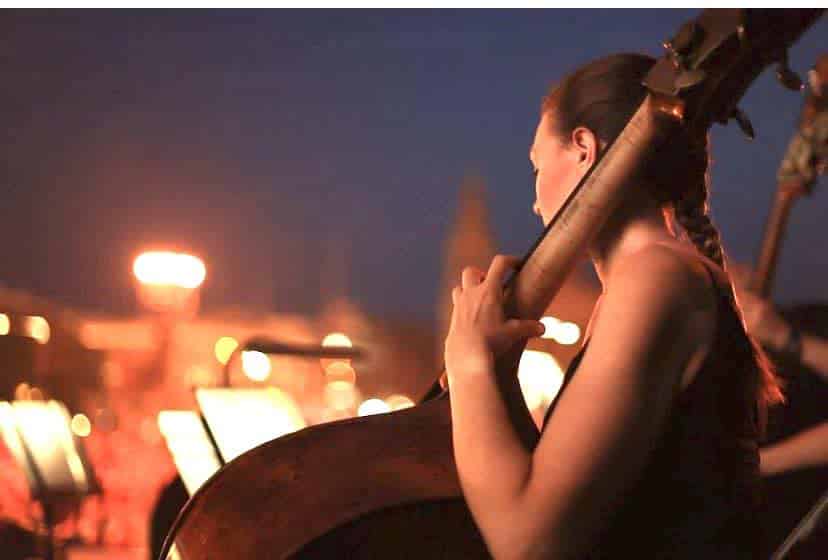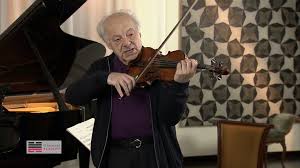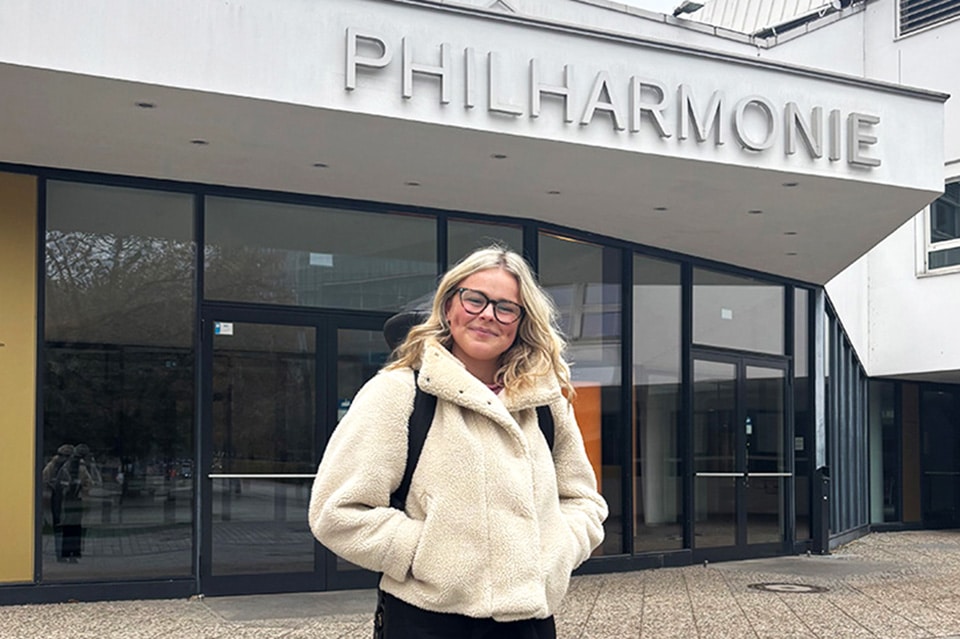Barenboim summons 10 composers to Berlin
mainDaniel Barenboim and the Berlin Phil principal flute Emmanuel Pahud have convened a meeting in Berlin of 10 composers to present new works for the present time.
Composers led by Jörg Widmann, Olga Neuwirth and Matthias Pintscher will gather from July 9 to 12 in the Pierre Boulez Saal to hear works by Irini Amargianaki, Philippe Manoury, Luca Francesconi, Benjamin Attahir, Michael Jarrell, Johannes Boris Borowski and Christian Rivet.






They forgot Segerstam!
“Conoravirus chaoticlies in prisonic moods”
Hahahaha, amazing Gustavo. History will make proper justice to his master works.
“Composers led by Jörg Widmann, Olga Neuwirth and Matthias Pintscher….”
They are not composers, but sound artists, Klangkuenstler. Their selection won’t represent the art form of music. And sound art is by no means an art form ‘for the present time’, since it entirely ignores the concerns of our time. Which is understandable, since its aesthetic ideas were born in the short period after WW II, when there were entirely different concerns: away with mimesis, with expression, with beauty, with musical meaning through relationships between tones, because they were all associated with a culture that had ’caused’ two world wars. The arts were thought to be a product of an entirely decadent and stuck civilisation, so everything had to begin with zero and the goal was always to be ‘the future’, something behind the horizon (and to be staying there). And the zero, plus the obsession with ‘progress’, had to be repeated eternally, because the narrative of avantgarde thinking had to protect positions in music life – however endangered and fringe they may be.
What are, then, the concerns of our time? Humanism, environmentalism (a more holistic and understanding approach towards nature), the understanding of the human being as an emotionally-reactive one with an ‘inbuilt’ need for order and beauty and meaning, and the concept of ‘progress’ understood as ‘improvement’ and not as something that has a value in itself.
Barenboim never understood these things, being a product of the postwar period. In his books he claims to support a humanistic culture, but he never understood what that would mean in relation to, for instance, Klangkunst. So it is very appropriate that this event takes place in a hall named after one of the Klangkunst founders, who was (by his own proud admission) a leninist, and helped the damaging forces to do their work at the fringes of music life where it created havoc, as a small but enduring epidemic, infecting especially the human brain.
Why can’t sound art be considered music?
Because the entire psychological dimension is missing. Compare it with music, and it shows to be flat, one-dimensional, mere pattern making. It does not ‘say’ something. There is no narrative, no structure with articulation points, all structure is random because it has no expressive meaning, as structure has in music. Hence, every structure in sound art is OK, there are no wrong notes, no flawed structures, no mistakes.
Expecting that sound art is a form of music, is unfair, because then it shows its defects and limitations all too obviously. It does not want to be more than pattern making so if you want to really understand and enjoy sound art, you have to forget music and all the associations music invokes. Only then, you can enjoy the patterns, because some of them can be really beautiful, as patterns, as an ‘acustical object’. Sound art is not communicative like music is. (Ligeti: ‘My works are not for the audience, they are not for me, they are things in themselves, objective’.)
You’ve made some compelling points.
Surely, the notions of progress in music — Zukunftsmusik — predate the end of WWII: they stretch back at least through Wagner and Liszt. While I have my doubts about the notion of continual progress in music, I also have very high regard for Liszt as one of the first experimental composers in music.
The problem with some — not all! — composers of a progressive or experimental music is that they often confuse the invention of new means with the musical ends. Then their works turn out to be a collection of effects without causes.
That notion of “progress,” it seems to me, is directly tied to the Industrial Revolution, and so, treats music like a product that must be constantly improved and changed, rather than as a timeless, classic art. And you could say they got a lot of mileage out of it, until the anti-music of serialism came along. Fortunately, classical traditions never die out, they just move into the background, but they’re still there. The history of music is not one of periods, but of a thick rope made of many strands, all of which are ever-present, but as it turns, a few are in more-prominent focus. It is time to get back to classical traditions.
I like the metaphor of a river which spreads itself into a delta…. which is more or less the same image. A cultural tradition if well understood is something living and can be interpreted again and again, as it has always been. 20C sound art wanted to create a totally new form of music by rejecting tradition, and in the same time wanted it to be respected and considered as a natural development of the musical tradition, which is nonsensical, you cannot have your cake and eat it. I think the postwar founders of sound art (Boulez, Stockhausen, Xenakis, etc.) did not realize they were more radical than they thought, they did not invent a new music, they invented an entirely new art form, an abstract one.
By the way, there have been already quite some composers injecting new life into tradition, like Nicolas Bacri and Guillaume Connesson in France, David Matthews in England, and a number of composers in the USA. The new music circuit on the European continent is still burdened by ideas of half a century old, with the usual circulation of sound artists educating students who educate next generations, etc. etc. – all under the reactionary orthodoxy that this is the only way to ‘write music’.
I don’t agree. I can hear antecedents in the work of Stockhausen , Boulez and even Xenakis (perhaps the most interesting of the three for me).
At the risk of being pedantic :
No Stockhausen without Webern, and no Webern without Mahler etc.
Xenakis -the least dogmatic of the trio- particularly liked Brahms’s String Sextet op.18
The Zukunftmusik of Wagner and Liszt is still fully musical, their experiments were informed by a profound understanding of musical processes. Their terming their work in that way, was silly, and it paved the way for the 20C nonsense. Interestingly, Liszt predicted atonal experiments (late in his life), and explained to a student – forgot who it was – that in half a century, one could use all the 12 tones together as a chord and it would not be a dissonant. He added, that music would then have ceased to exist. He was quite gloomy about it.
Is this the classical world way of saying “I feel left out”?
Actually, the sound artists feel being ‘left out’ because the central performance culture is not really accepting the stuff. Sound art is heard at special festivals, or special occasions, but it does not draw much enthusiasm from music lovers. It never ‘caught on’, because ‘audiences are conservative’ and managements ‘don’t understand their own time’. These are cop-outs to avoid the real problem of sound artists: they try to sell their works as music.
For people who like to read about the paranoid and suicidal ideas of sound artists, beginning with Helmut Lachenmann, the ‘greatest’ sound artist of contemporary Germany, is a must:
http://subterraneanreview.blogspot.com/2015/11/be-liberated.html
Inciteful question. My answer is, yes to some extent.
If one really looked at great composers’ response to, say, World War II, you will find that a number of them turned to writing music for the harp. Hindemith, Casella, Rota, to name just a few. Why is attention only paid to the ones who tried to literally depict the destruction?
Good question….
Dissonance was used to avoid the impression of connection, of relationship, of tradition, of tonality. So, if you want to avoid the reference to traditional music, you have to write a lot of dissonance, and the uglier it sounds the better. There is a whole world of paranoia in 20C ‘new music’ which could furnish a library full of psychopathological research.
You do realise you are just shifting the goalposts by defining what “composers” are in such a way that the category cannot include the present list of Pintscher, Neuwirth etc. I think there should be room in the definition for all those creating music, regardless of style.
Yes, music as an art form should be a pluralistic field, even independent from the quality question. But the distinction between music and sound art is about fundamentals. A photograph is not a painting, in spite of similarities, and cannot be judged in the same way a painting is judged. So it is with sound art.
In fact, it is quite simple: if anything can be art, nothing is; if any sound can be music (John Cage), nothing is.
I would say that this is where context and decision are key. If one is walking down the street, it is possible choose to hear a certain musicality, narrative or expressive quality in traffic noise. If traffic noise is presented in recorded form as part of a musical composition within a space where musical compositions are usually presented, then we can choose to accept it as a piece of music. I would argue that it is not quite anything that can be music, but anything that we choose as such. In the end it is much like a game, coming back to the goalposts idea from my previous comment: we set certain rules and we play by them. Different people/views/factions make different, not always compatible rules. I’m sure that according to their own rules and internal logic, at least some of the people named in this article would consider themselves composers rather than sound artists. I, for one, would see no reason to contradict them.
But look at painting. Abstract painting, which consists only of patters and colours, remains on the surface, and it can be agreeable or disagreeable – for instance, Kandinsky or Rothko. In a figurative painting, say by Titian, an entire world is invoked, and the onlooker looks into an imagined space, which is the creation of the painter. Nothing in a Titian painting needs to be ‘real’, or to represent bits from reality, yet we see it as an imagined reality with psychological / emotional qualities, apart from the purely aesthetic ones. Paint which is only paint and nothing else, is material art, like sound which is only sound is a material, acoustic phenomenon. A musical work is comparable with figurative painting in the sense of creating an imagined world: visually in painting, emotionally in music.
But in a figurative painting, abstract elements can function as an additional touch, as often in Monet. But the context is still figurative. In music, there may be purely acoustical bits, as in Debussy: they function as a colouring of something else which is musical. The context remains musical. Some postwar sound artists thought that you could take-out Debussy’s purely acoustic bits and use them as the central material of music. But then they did away with the musical context (this misunderstanding is blatantly obvious with Boulez’ enhusiasm about Debussy’s “Jeux”, for instance).
In her imaginative ‘Acrostic Wordplay’ contemporary sound artist Unsuk Chin uses, in one short movement, a pure triad to create a musical context, surrounded with sound art bits, and suddenly the sound art becomes part of a musical situation, thanks to the triadic context. The rest of the work remains purely acoustical, it is a good example, showing the fundamental distinction and the function of contexts:
(at 11:22)
https://www.youtube.com/watch?v=ZgXnvVDTDEY
The best that sound art can achieve is decorative, not musical. Nothing wrong with this, but it is absurd to claim that sound art is the only inevitable way music can develop – an idiotic notion still around.
we come back to where one draws the line as to what “musical” means or where “emotionality” can be found. you’ve found your rules for the game. I find them a bit narrow, but it is not crucial to humanity that we all agree on aesthetic principles.
what I do completely agree with is the last phrase regarding what some see as this type of music being the only inevitable development – a relic of the immediate post-war vibe. I think its power as dogma has diluted somewhat over the past 50 years.
How about new works for some other time? To me, classical music is timeless, not about when it is written.
‘Classical art is atemporal, like mathematics’. Leon Krier, architect, urban planner, founder of a classicist movement in architecture and of ‘new urbanism’ which wants to restore the city scape a a humanist enterprise.
https://en.wikipedia.org/wiki/L%C3%A9on_Krier
Something we also need in music.
When does the notable lack of american composers in such groups become an ideological statement?
American composers are much less burdened by postwar pathologies….. they are more free. It was George Rochberg, for instance, one of the first composers who after excelling in modernism, and made quite a name for himself within the minority group where he belonged, who realised the negativity all around him and turned back to tonal traditions. For types like Barenboim, Widmann, Neuwirth and Pintscher this is merely a sinking-back into nostalgia and abandoning the Great Leap Forward.
I doubt that it was meant as a snub; No one from the US is allowed to enter EU because of our present state of high prevalence of COVID-19
Some fellows around here forget that criticising that much generally tells more about you than the actual thing you’re trying to judge. Beautiful German terms with lousy ideas to match the mediocre careers.The glory of the internet. Pahud, Barenboim et al. are so worried about all this. Just go tonal (or whatever you like) and be happy.
That’s what I say all the time! Just have fun, all that thinking is pointless.
Sally
And then there are Klangverwalter.